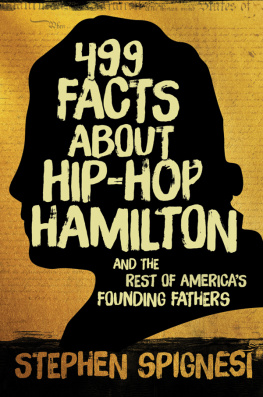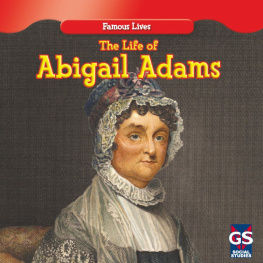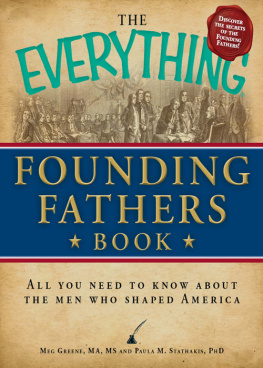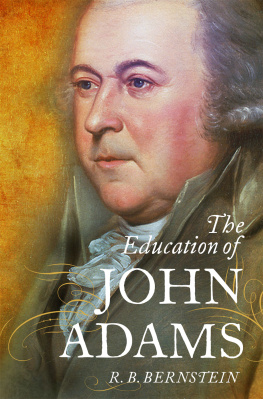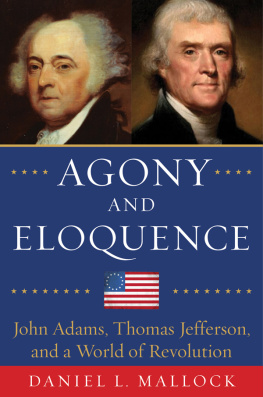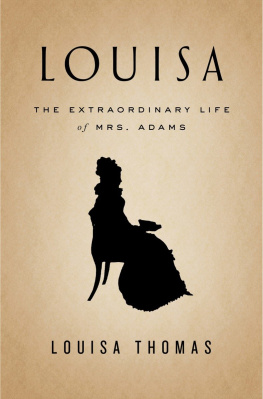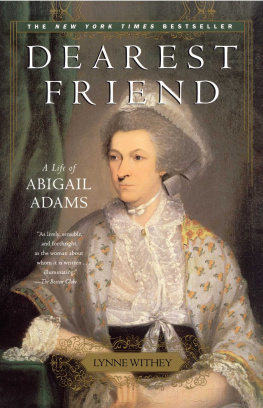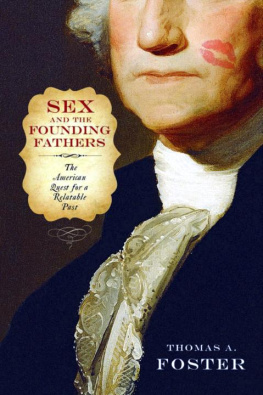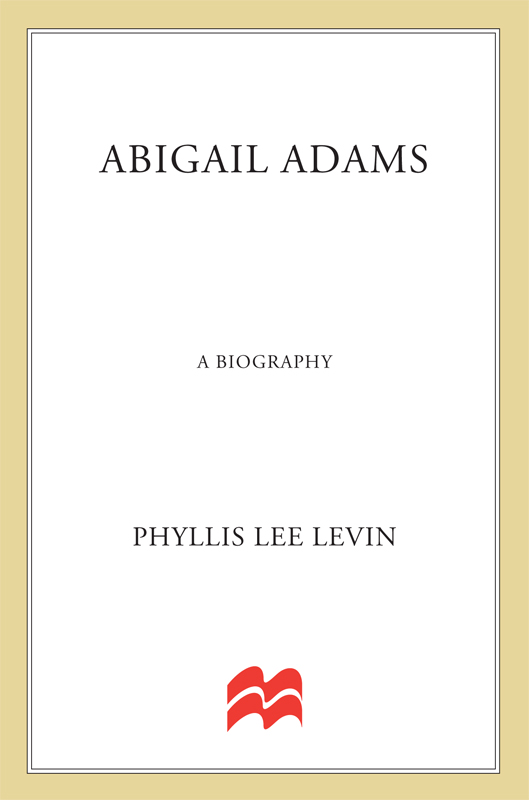
The author and publisher have provided this e-book to you for your personal use only. You may not make this e-book publicly available in any way. Copyright infringement is against the law. If you believe the copy of this e-book you are reading infringes on the authors copyright, please notify the publisher at: us.macmillanusa.com/piracy.
Contents
For my husband;
for my children and theirs.
I know the voice of Fame to be mere weathercock, unstable as Water and fleeting as Shadow. Yet I have pride, I know I have a large portion of it.
ABIGAIL ADAMS
The Quincy-Smith Family


The John Adams Family


Preface
I first met Abigail when I was writing a book about historic houses in America, fifty houses in all. I had agreed to do that book if I was permitted to concentrate on the people who had lived in the houses, rather than on the curtains they hung. As the particular house I was writing about at that time was that of the Adams family in Quincy, Massachusetts, I asked my son John if he would look in the library at Columbia University to see if there was anything about Abigail, judging hers to be the domestic responsibilities, while her husband attended to his duties as a statesman. Late one afternoon John produced two thin withered volumes of the Letters of Mrs. Adams, and I was committed to Abigail before I finished reading the first volume, edited so protectively by her grandson Charles Francis Adams.
I was struck by how immediately her concerns transcended the centuries. She had the vision to support (if not invent) the principle that women should have political, economic, and social rights equal to those of men. I thought it remarkable that the prim design of her early years did not stifle her dreams, or her understanding of womens timeless dilemma, the challenge of balancing domesticity with intellectual pursuits. How miserable must that woman be, Abigail supposed, who allowed herself to be confined to a narrow circle of domesticity with no higher sites in mind. More to be pitied, however, was the woman of both genius and taste who could not cheerfully leave her intellectual pursuits to tend to the daily cares of the prudent housewife. But Abigail sympathized with the rigorous demands on the gifted and ambitious. Such talents and such devotion of time and study, she said, exclude the performance of most of the domestic cares and duties, which exclusively fall to the lot of most females in this country.
Another reason for writing about Abigail was to recognize her role as founder of an amazing, and Americas most enduring, dynasty. Abigails husband, John, an Awakener of the Republic, helped to draft its Declaration of Independence and served as its first minister to England, its first Vice-President, and its second President. Their eldest son, John Quincy AdamsHarvard rhetorics professor; minister to Prussia, Holland, Russia, England; Secretary of State; sixth President of the United States; senator and representative early and late in lifesired a son, Charles Francis, who was ambassador to Britain, legislator, historian, Fellow at Harvard. The line has persevered, despite its share of casualties, with politicians and financiers, bibliophiles and philosophers, noble eccentrics, artisans, writers. To be an Adams seems synonymous with being a writer, almost always of some merit, and, in the case of Henry Adams, of sweeping acclaim.
A third reason for a book about Abigail Adams is to honor her talents as a journalist who left behind a poignant report of the American Revolution. It is her letters that are her bequest; they document the colonial era with sewing-circle intimacy as they also plumb the depths of her own resourceful mind. John Adams fondly appreciated her contribution, along with those of several women with whom he corresponded: In Times as turbulent as these, commend me to the Ladies for Historiographers. The Gentlemen are too much engaged in Action. The Ladies are cooler Spectators. He singled out Abigail in particular when he added: There is a Lady at the Foot of Pens Hill, who obliges me, from Time to Time with clearer and fuller Intelligence, than I can get from a whole Committee of Gentlemen.
* * *
I have, in the mounting years since I began documenting Abigails life, been privileged to share in her amazingly prodigious wealth of letters at libraries in Washington, Worcester, Boston, Philadelphia, and New York. I have read some of the books she valued that are keepsakes of the British Museum; seen antique maps at the Bibliothque nationale in Paris that reveal the pastoral landscape of Auteuil where she lived in reunion with her husband and two children for a fleeting eight months. I have stood in Grosvenor Square imagining Abigails adjustment to the fine stone mansion that was the first American embassy in Great Britain, and I have walked the craggy four miles, with my daughter, Emme, from Auteuil to the Place de lOpra, to understand why Abigails friends found her house too remote to visit, which she claimed they did.
All these years, and all the hundreds of pages of manuscript later, my admiration and affection for Abigail are intact. Yet her story is not without problems for me, reminiscent of E. B. Whites appraisal of Thoreaus Walden: not a simple and sincere account of a mans life [but] a journey into the mind. To write her biography justly is to recognize that for the first forty years of her life she journeyed but a few dusty miles from her fireside; traveled mostly between parlor and field; chatted, in the main, with the farm hands, her childrens tutors, and a handful of relatives. Her most daring and valuable excursions originated at her writing table in the candlelit quiet of infinite solitary nights. Neither artist nor actress, neither musician nor courtesan, she is simply a woman whose claim to immortality is based on a flair for independence, a gift for language, extraordinary intellect, and her love of family and country.
I think of Harold Pinter writing the screenplay of a Proust work and saying that in no sense could he rival the word, but he could be true to it. In Abigails case, given her glorious letters, my contribution, I would hope, is perspective, along with preservation. As I type, I recall the portrait Gilbert Stuart painted of her, a portrait of age, though it was begun in 1800. The Abigail that Stuart introduces to us appears to be swathed in a sheer handkerchief, from which scarcely a handful of curls protrude, the whole riveting the viewers attention to the sitters precise mouth, firm chin, thrifty facial planes, and Mona Lisa gaze, as inscrutable as it is intolerant of compromise.
But there is a greater depth to Abigails story. Ultimately, I am convinced that to write her life is to write of a partnership. As impassioned a patriot as her husband, her country was as a Secondary God to herthe two inseparable emotionally and philosophically. Abigail and John were united in their dedication to the struggle of founding a new nation, educating and rearing a family, and nurturing their extraordinary romance. He loved her as his best, dearest, worthyest, wisest friend, over fifty-four years of marriage and beyond.




